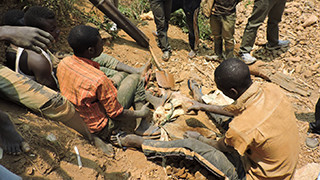iTSCi has brought about significant change and achievement in the application of due diligence in 3T mineral supply chains related to our primary mission around prevention of conflict and human rights abuses. Beyond these issues it is possible to do much more to improve the working conditions of artisanal and small scale miners who sometimes work in less than ideal situations. For example, miners and sometimes the DRC mining authorities (SAESSCAM), tend to have a limited knowledge of basic Occupational Health and Safety (OHS) principles. However, thanks to additional funding from Qualcomm and the Dutch Ministry of Foreign Affairs, iTSCi is able to work at some sites to improve OHS practices.
iTSCi staff were pleased to be able to deliver a three-day ’training for trainers’ on OHS topics for 30 SAESSCAM agents in August 2016 in Bukavu, South Kivu. On the agenda was advice on safety risk analysis, the use of personal protection equipment, the importance of underground ventilation, shoring, and proper hygiene at work, among others. Following the desk based training, a practical risk analysis exercise was carried out at Kalimbi, where the new trainees were raising awareness, identifying OHS risks (suffocation, cave-ins, inhalation of dust, musculoskeletal pains) and putting in place a multi-stakeholder OHS committee to identify and mitigate risks in the future.
Three months later, the training has already had a positive impact: “We used to do a lot of things because of ignorance. Now that the Kalimbi OHS committee is in place, we have changed our working habits…we now limit the number of miners in the pit to prevent suffocation and we are using ribbons to signal danger or risk. Whistles were also distributed to alert in case of danger”, explained Carlos Lunanga, the Kalimbi mining cooperative team leader.
“This training has contributed to building our skills regarding awareness raising of risks in the mine. Now, miners are informed about precautionary measures to antici-pate and mitigate potential risks” underlined Leon Amini, a local SAESSCAM official.
Besides the close follow-up by iTSCi staff of the activities at Kalimbi, ’train the trainer’ workshops have also been delivered in North Kivu, other parts of South Kivu, and Ma-niema. “It is very important that artisanal miners incorporate health, hygiene and safety concepts into their work habits. This will allow them to improve their health and increase their productivity. In the end, it will benefit the entire community”, explained Marcel Mukwaka, capacity development officer of Pact in DRC. “Much more can be done to improve the lives of the mining communities, but this is a first step.”
Further ideas on opportunities to support these important projects can be found here

Incorrect posture that could lead to musculoskeletal pain, identified as OHS risk during training in Kalimbi, South Kivu [Photo: Pact]
